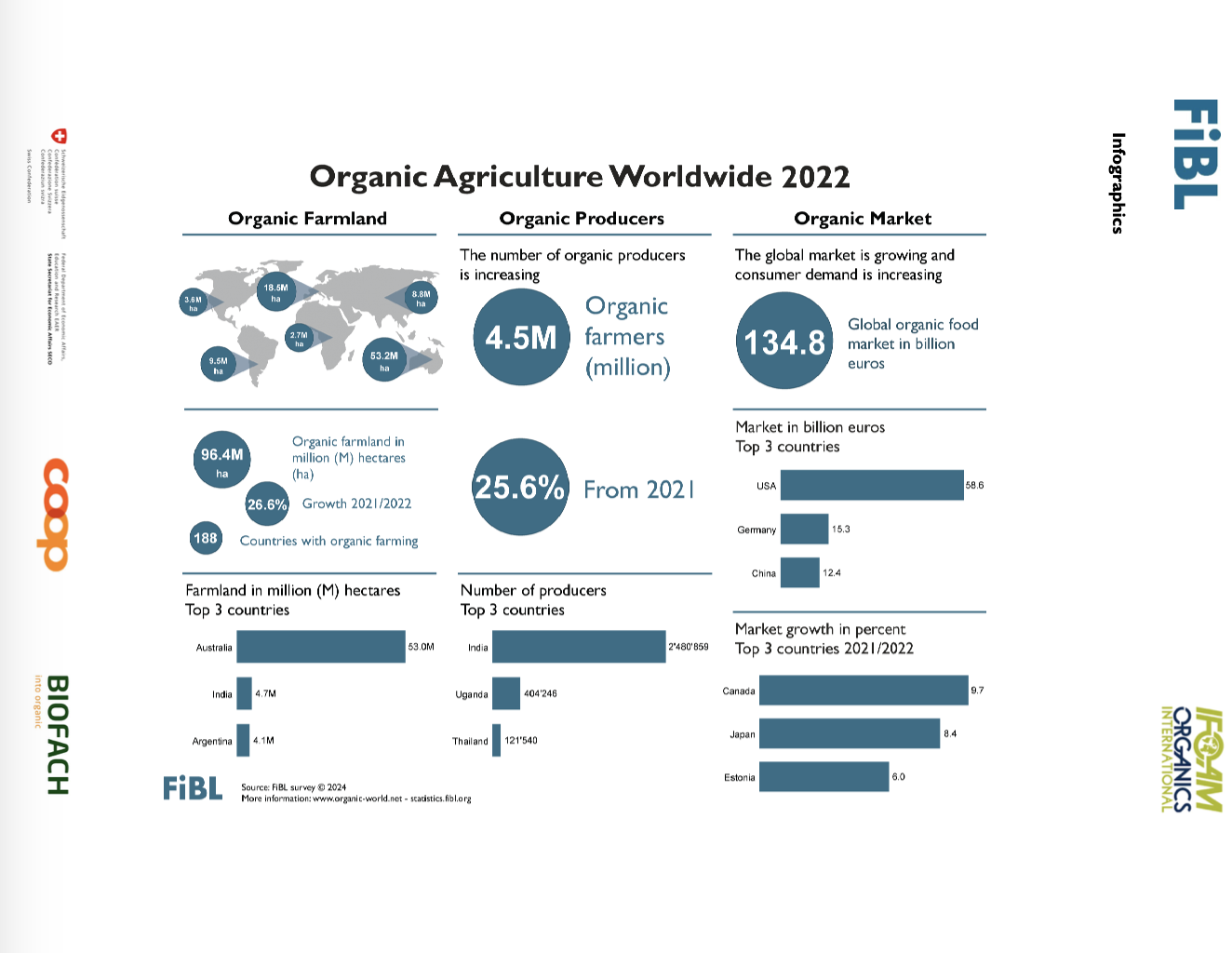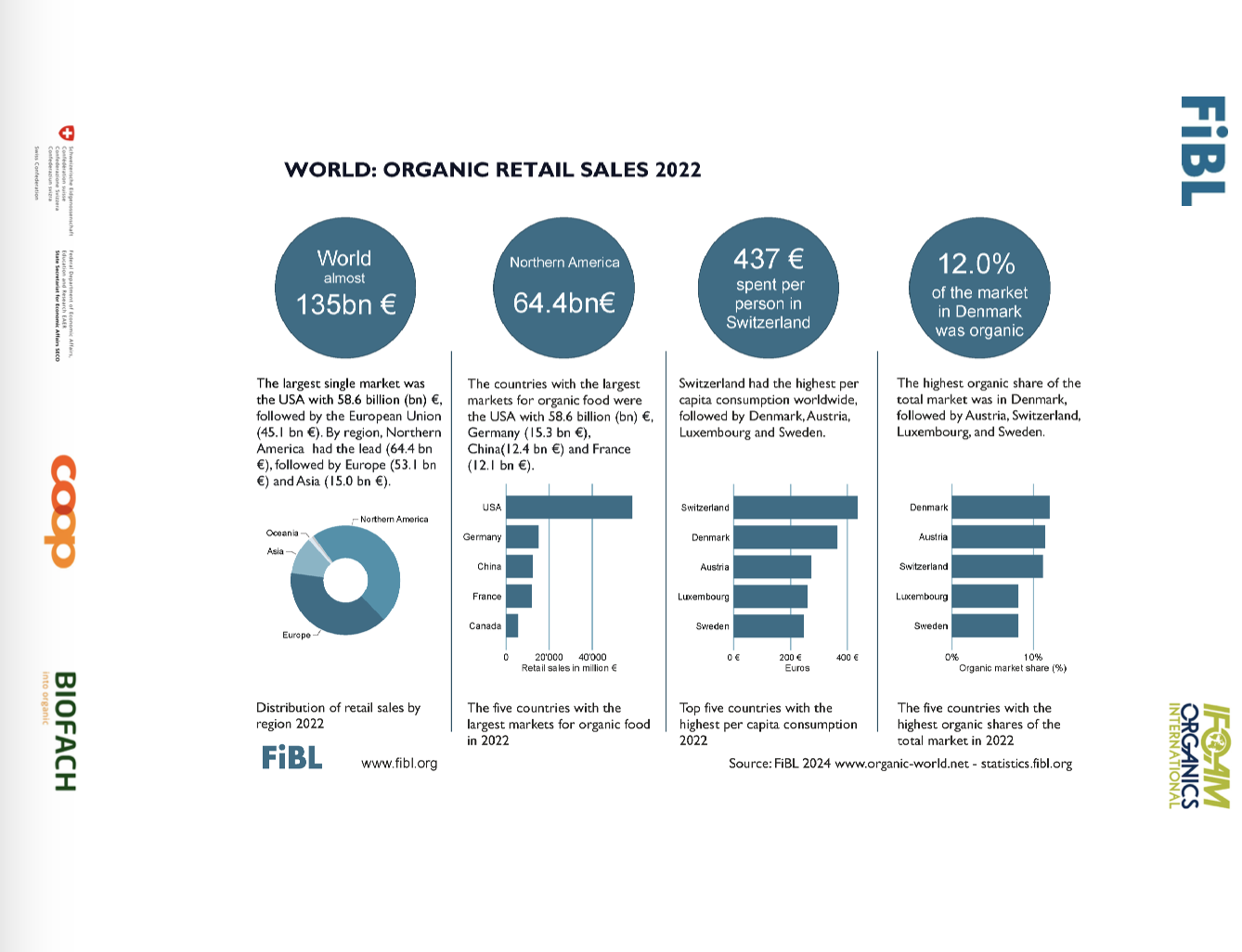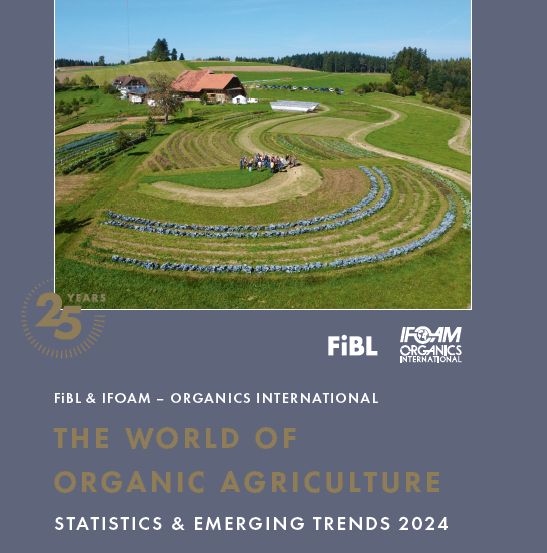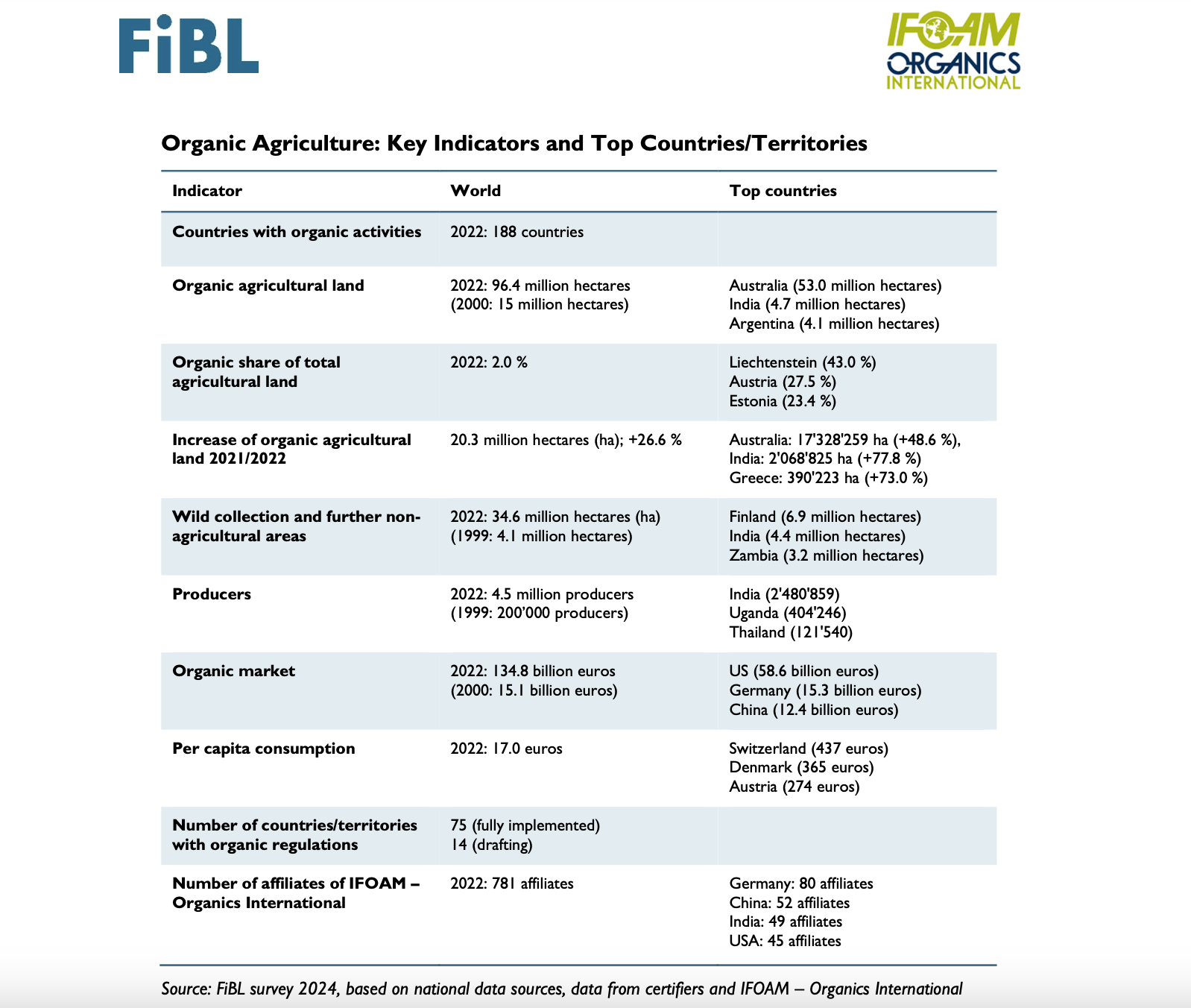The global organic farming area increased by over 20 million hectares in 2022, reaching 96 million hectares. The number of organic producers also saw a significant rise, surpassing 4.5 million. The sales of organic food reached nearly 135 billion euros in 2022. The latest figures and the statistical yearbook "The World of Organic Agriculture", which is being published for the 25th time this year, will be presented on Tuesday, 13 February 2024 from 3.45 to 4.45 pm (CET) at BIOFACH, the world's leading trade fair for organic food in Nuremberg.
(Frick/Bonn, February 13, 2024) The 25th edition of the yearbook "The World of Organic Agriculture", jointly published by FiBL and IFOAM – Organics International, shows that the growth in area and number of farms in 2022 far exceeded that of previous years, particularly due to increases in Australia and India. Data were provided by 188 countries.
The annual survey on global organic agriculture is supported by the Swiss State Secretariat for Economic Affairs (SECO), the Sustainability Fund of Coop Switzerland, and NürnbergMesse, the organiser of BIOFACH trade fair.
By the end of 2022, 96.4 million hectares were under organic management, representing an increase of 26.6 percent or 20.3 million hectares compared to 2021. Australia showed tremendous growth (+17.3 million hectares) and remains the country with the largest area of organic agriculture at 53 million hectares, followed by India, the new number two (4.7 million hectares), where the area also increased significantly.
The organic farming area increased on all continents. Over half of the organic area is in Oceania (53.2 million hectares), followed by Europe with 18.5 million hectares and Latin America with 9.5 million hectares.
In 2022, 2.0 percent of the world's agricultural land was managed organically. However, many countries have much higher shares: Liechtenstein was at the top with 43.0 percent, followed by Austria (27.5 percent) and Estonia (23.4 percent). In 22 countries, 10 percent or more of the total agricultural land was managed organically.
In 2022, 4.5 million organic producers were reported, an increase of almost 26 percent, primarily due to a significant increase in India. India also remained the country with the most organic producers in 2022 (2.5 million producers).
In 2022, the organic market reached nearly 135 billion euros. The United States continued to be the world's leading market with 56.6 billion euros, followed by Germany (15.3 billion euros) and the new number 3: China (12.4 billion euros). While several countries in Europe experienced a decline, retail sales in Canada (+9.7 percent) and the United States (+4.4 percent) increased. The Swiss spent the most on organic food (an average of 437 euros per person), and Denmark continued to have the highest share of the organic market at 12 percent of the total food market.
The momentum of the organic sector is also evident in various activities to support organic agriculture. Many countries have launched action plans or other policy measures to promote organic farming. This positive trend is reflected in the increase in fully implemented national regulations for organic agriculture, which rose to a total of 75 in 2023.
"We are very pleased that, thanks to the great commitment of numerous supporters from all over the world, we can celebrate the 25th anniversary of the yearbook," says Helga Willer from the Research Institute of Organic Agriculture (FiBL), who has been responsible for the publication along with colleagues for 25 years.
For Jürn Sanders, Chairman of the Management Board of FiBL Switzerland, "The World of Organic Agriculture" is one of the most significant flagship projects of FiBL. "I take great pride in it," he added.
"The statistics book measures the pulse of the organic sector and it is a key reference point for us when it comes to showcasing the impact and constant development of organic agriculture worldwide – it is an invaluable resource," emphasizes Karen Mapusua, President of IFOAM – Organics International.
For Danila Brunner, Executive Director of BIOFACH, this publication is a must-read. "It provides well-founded facts and analyses, offering guidance and setting the course for the future!"
-
Helga Willer, Research Institute of Organic Agriculture FiBL Ackerstrasse 113, 5070 Frick, Switzerland
Phone +41 79 218 06 26, helga.willer@fibl.org, www.fibl.org
-
Ravi P. Prasad, IFOAM – Organics International, Charles‐de‐Gaulle Strasse 5, 53113 Bonn, Germany r.prasad@ifoam.bio, www.ifoam.bio
This media release and graphs can be accessed online at https://www.fibl.org/en/info-centre/media.html.
Download “The World of Organic Agriculture”
The yearbook can be downloaded at https://shop.fibl.org (item number 1747).
Graphs and infographics (see also following pages) can be downloaded at https://www.organic-world.net/yearbook/yearbook-2024.html.
Sessions at BIOFACH
Session “The World of Organic Agriculture – Statistics and Emerging Trends” on 13 February 2024.
Tuesday, 13 February 2024, 3.45 to 4.45 pm CET, BIOFACH Congress, Nürnberg Messe, Room St. Peterburg
- Julia Lernoud, IFOAM – Organics International: Introduction and presentation of program and speakers, Moderator
- Marco Kräuchi, SECO: Welcome address from SECO
- Helga Willer, FiBL: Overview on global figures
- Vladyslav Zhmailo, IFOAM – Organics International: Global overview on policies and regulation
- Amarjit Sahota, Ecovia Intelligence, UK: The global market for organic food
Info: https://biofach.fibl.org/en/biofach-all/biofach-2024#c73661
Session “Global Organic Market Overview” on February 14, 2024
Wednesday, 14 February 2024, 1.30 to 3 pm CET, BIOFACH Congress, NürnbergMesse, Room St Petersburg.
- Ravi P. Prasad, IFOAM – Organics International: Moderation
- Helga Willer, FiBL: Overview on global figures
- Eric Gall, IFOAM – Organics Europe: updates from Europe
- Julia Lernoud, IFOAM – Organics International: updates from Latin America
- David Amudavi, Biovision Africa Trust: updates from the African region
- Jennifer Chang, IFOAM Asia: updates from the Asian Region
- Tia Loftsgard, Canada Organic Trade Association: updates from Canada
- Tom Chapman, Organic Trade Association: updates from the USA
- Josefine Pettersson, Australian Organic Limited: updates from the Oceania region
Info: https://biofach.fibl.org/en/biofach-all/biofach-2024#c73659
The Research Institute of Organic Agriculture, FiBL is one of the world’s leading institutes in the field of organic agriculture. FiBL’s strengths lie in its interdisciplinary research, innovations developed jointly with farmers and the food industry, and rapid knowledge transfer. The FiBL Group currently includes FiBL Switzerland (founded in 1973), FiBL Germany (2001), FiBL Austria (2004), ÖMKi (Hungarian Research Institute of Organic Agriculture, 2011), FiBL France (2017) and FiBL Europe (2017), which is jointly supported by the five national institutes. FiBL employs more than 400 staff at its various locations.
The yearbook "The World of Organic Agriculture - Statistics and Emerging Trends 2024" (352 pages) presents the results of the annual survey on organic agriculture worldwide and has numerous tables, graphs, maps and infographics. It contains reports by experts on the organic sector and information on emerging trends across all regions as well as selected countries. It also provides background information on standards and legislation, policy support, and the global market for organic food. Further information and download link are available at www.organic-world.net/yearbook/yearbook-2024.html.
Data collection
The data on organic agriculture is collected annually by FiBL in collaboration with many partners from around the world. The results are published jointly with IFOAM – Organics International. The activities are supported by the Swiss State Secretariat of Economic Affairs SECO, the Coop Sustainability Fund, and NürnbergMesse, organisers of the BIOFACH trade fair.
Book citation
Willer, Helga, Jan Trávníček and Bernhard Schlatter (Eds.) (2024): The World of Organic Agriculture. Statistics and Emerging Trends 2024. Research Institute of Organic Agriculture FiBL, Frick, and IFOAM – Organics International, Bonn. Available at www.organic-world.net/yearbook/yearbook-2024.html.
Where to download
The book can be downloaded at https://shop.fibl.org (order number 1747).
Online database and interactive infographics
The data is available online at https://statistics.fibl.org.




